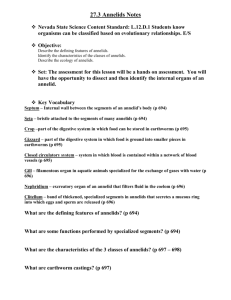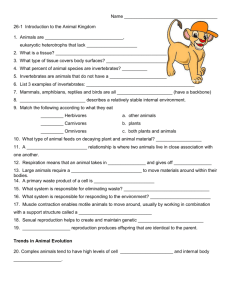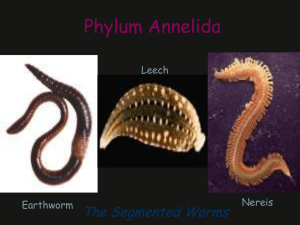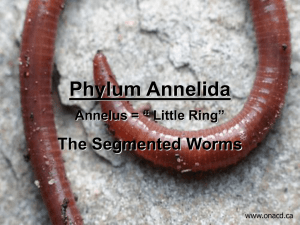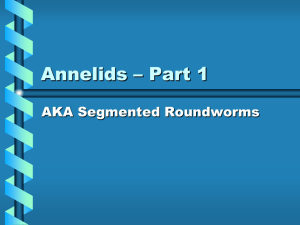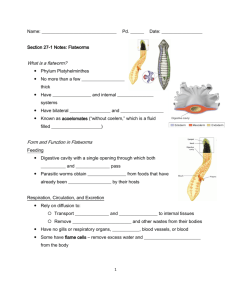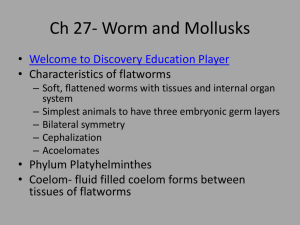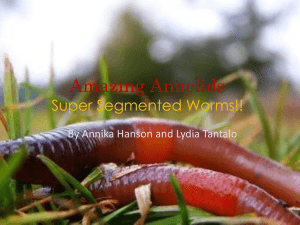Chapter 27, Worms and Mollusks (continued)
advertisement
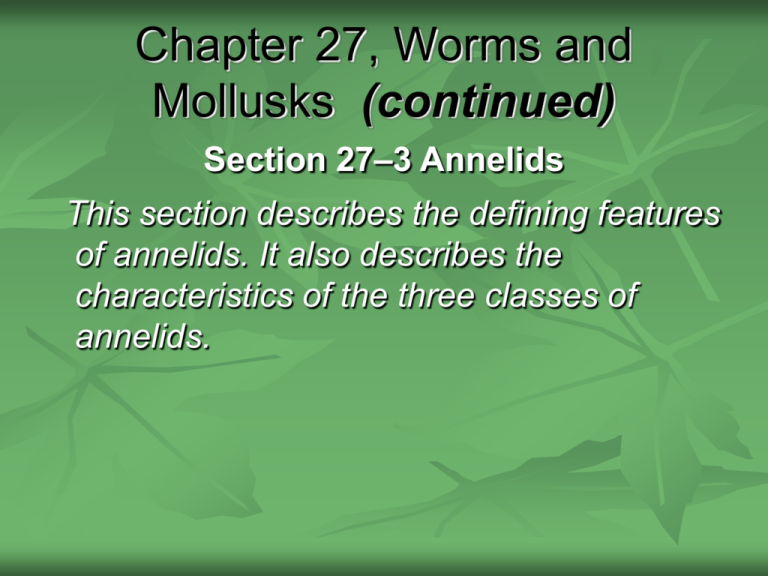
Chapter 27, Worms and Mollusks (continued) Section 27–3 Annelids This section describes the defining features of annelids. It also describes the characteristics of the three classes of annelids. Chapter 27, Worms and Mollusks Annelids What phylum are earthworms a member of? Annelida Chapter 27, Worms and Mollusks Annelids What evidence is there that annelids are more closely related to clams and snails than to flat worms or roundworms? t Annelids, clams, and snails all share a similar larval stage. What Is an Annelid? What is a septum? A septum is an internal wall between two segments of an annelid’s body. Chapter 27, Worms and Mollusks Annelids Attached to each annelid segment are bristles called Satae . Chapter 27, Worms and Mollusks Annelids Annelids are among the simplest animals to have a true coleom. Form and Function in Annelids How is the pharynx used differently in carnivorous species than in annelids that feed on decaying vegetation? In carnivores, the pharynx usually holds two or more sharp jaws that are used to attack prey. In worms that eat vegetation, the worm collects food by extending a pharynx covered with sticky mucus and pressing it against the surrounding sediments. Chapter 27, Worms and Mollusks Annelids What is a closed circulatory system? It is a system in which blood is contained within a network of blood vessels. Chapter 27, Worms and Mollusks Annelids What is a gill? A gill is an organ specialized for the exchange of gases underwater. Chapter 27, Worms and Mollusks Annelids How do aquatic annelids respire differently than land-dwelling annelids? Aquatic annelids often breathe through gills, while land-dwelling annelids respire through moist skin Chapter 27, Worms and Mollusks Annelids How do annelids keep their skin moist? They secrete a thin protective coating called a cuticle. Chapter 27, Worms and Mollusks Annelids What are the two major groups of body muscles in annelids called? Longitudinal muscles Circular muscles Chapter 27, Worms and Mollusks Annelids Marine annelids have paddle like appendages called parapodia . Chapter 27, Worms and Mollusks Annelids What is a clitellum, and what is its function? A clitellum is a band of thickened, specialized, segments that secrete a mucous ring into which eggs and sperm are released. Annalids Write labels on the illustration of the annelid for each of the features pointed to. OLIGOCHAETES Earthworms Long, pinkish-brown worms with few setae Woods, fields, and gardens Type of Oligochaete Description Habitat Earthworms Description: Long, pinkish-brown worms with few setae Located: Woods, fields, and gardens Type of Oligochaete Tubifex worms Description: Red, threadlike worms with few setae Located: Aquatic environments Chapter 27, Worms and Mollusks Annelids Circle the letter of each sentence that is true about leeches. They suck blood and body fluids from their hosts. Most live in moist, tropical habitats. They are typically external parasites. All are carnivores that feed on snails. Chapter 27, Worms and Mollusks Annelids What annelids do polychaetes include? They include sandworms, bloodworms, and their relatives. Chapter 27, Worms and Mollusks Annelids Circle the letter of each sentence that is true about polychaetes. a. They typically have only a few setae. b. They have paired, paddlelike appendages tipped with setae. c. They suck the blood of their host d. They are marine annelids. Guided Reading and Study Workbook/Chapter 27 Chapter 27, Worms and Mollusks Ecology of Annelids How do the tunnels of earthworms affect other organisms? Earth worm tunnels provide passageways for plant roots and water and allow the growth of beneficial, oxygen-requiring soil bacteria. Chapter 27, Worms and Mollusks Annelids Circle the letter of each sentence that is true about annelids. a. Earthworms are important to the diet of birds. b. Annelids bring minerals from deep soil layers to the surface. d. Annelid larvae form part of the animal plankton.
